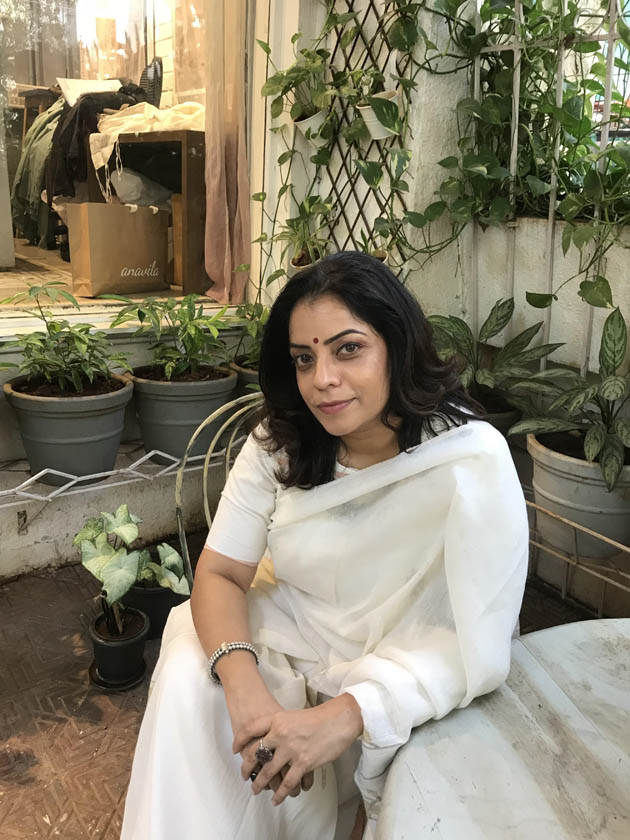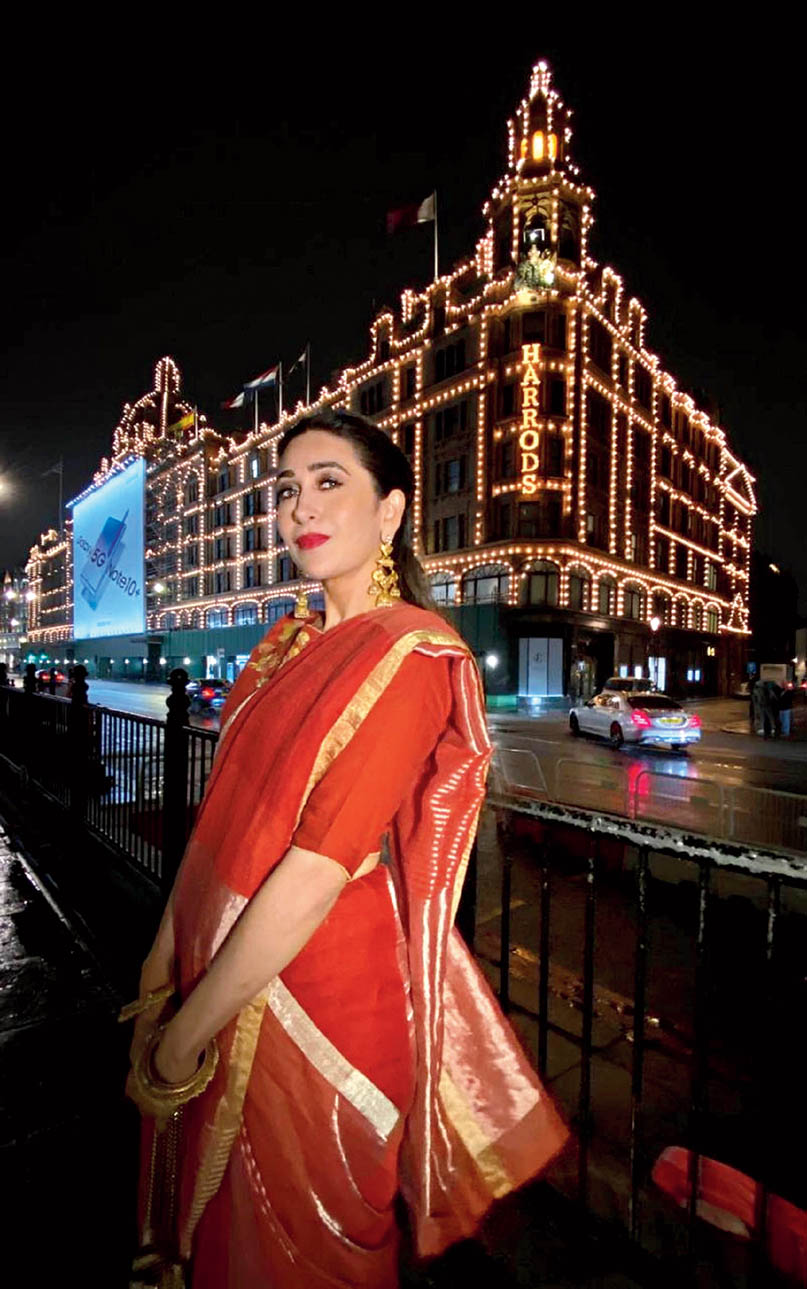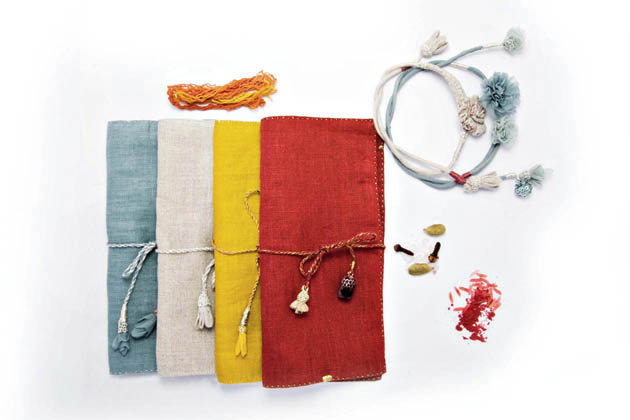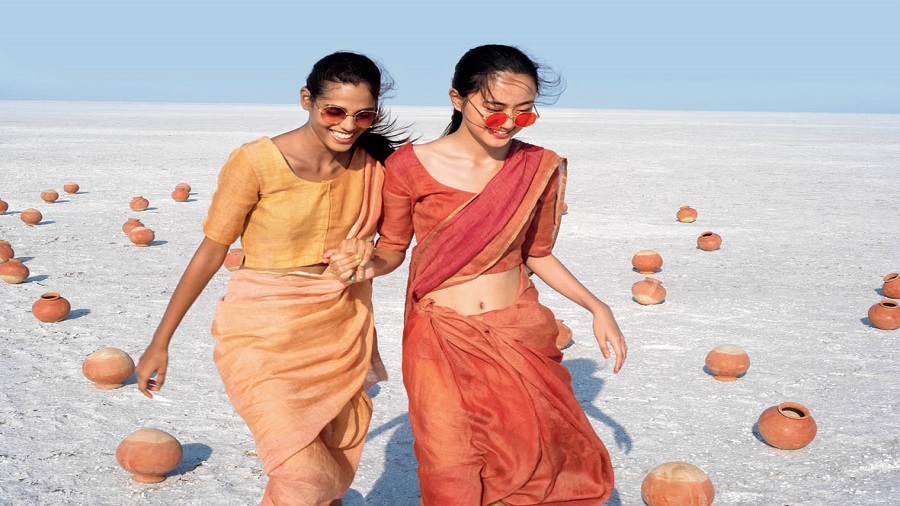As a kid, fashion designer Anavila Misra always “prayed” for a brother. And from the day he arrived eight years after her, till today, he remains her baby brother. “It was the most exciting thing in our lives,” says Anavila, the eldest of the three siblings. Her sister is her “closest in the entire world”, her “best friend and companion”. “I had an absolutely wonderful childhood,” she recollects to The Telegraph. This Rakhi, her Delhi-based sister and Gurgaon-based brother will meet up and Anavila, who is in Mumbai, will connect virtually. “My sister will tie him a rakhi from my side,” she says. A perfect epilogue perhaps to the Rakhi initiative that Anavila has been spearheading to help in picking that perfect sari for your sister.
This is such a heart-warming initiative...
This whole thing came about with Rakhi approaching. We have a lot of women artisans who work at our Gurgaon unit. Work in the last two months has been quite sporadic. We opened slowly with a few people returning to work. These women are very good with their handwork. We have always collected the leftovers from our productions and have been making accessories. So we decided to make rakhis as a trial. We just wanted to see how it looks because we have never done this before. You also want to fill in some enthusiasm in the team. We made a few and they looked so nice! It was just to create that momentum, that freshness with a product which was a natural extension because you are still working with fabrics and textiles and do all the details that we do on our garments like delicate sequins work somewhere or a bit of embroidery and threadwork. We have made hundreds of rakhis in the last few weeks. In India we are even sending all the Puja material which is not being sent abroad because of the customs problem. We are sending akshat, roli, mishri, laung, elaichi to make it special. The wraps made for the rakhis are also linen wraps.

Anavila Misra Sourced by the Telegraph
This is also a time when the brothers buy gifts for their sisters. Now that everything is happening online, we had a meeting with all my team members and we understood that it is difficult for men to decide how to buy a sari because they have no clue (laughs). So, we thought of navigating them through our collection in a way which helps them to make that decision. We decided on three broad questions, not difficult, which will help them choose a sari with confidence that they are making the correct choice. That’s how we segregated the entire range.
We have a lot of guys in the team, my husband, brother, a select group of clients whose husbands could pitch in. We did a survey with them before arriving at the questions. The first question is, ‘Does your sister have a big frame or a small frame?’ I have a very small frame... just 5’2”. So, I always consider the borders I am wearing. A strong, big border cuts into your frame. If it is a very big check, it gets lost on my body. Then ‘does she like spending time in nature if she has free time or would she rather spend it with her gadgets?’ If I am a nature-loving person, then I’ll drift towards more natural hues or motifs. And, the third one was ‘whether she likes to style herself traditionally or is she a bohemian, contemporary kind of a person?’ When you answer these, you go to a set of saris.
We haven’t limited it to the boys. Some of us are only two sisters and the bond is as strong. Though this festival has been built around a brother-sister relationship, that was more to do with olden times when men were considered to be the one with muscular strength. Very different times altogether to live in. The whole thing of security and protection were different from what it is now. Today it’s more about emotions, being there, navigating through difficult times and not so much about physically coming and helping someone. We have spoken about the sisterly love and sisterhood in our campaign, which was a very important part and in fact, a few enquiries have come from women to send a sari to their sister, which is so beautiful. They are all linen saris and some of them are with zari but predominantly the warp is linen in everything. We have hand-block prints and a few jamdanis.

Karisma Kapoor in gorgeous drapes by Anavila Sourced by the Telegraph
We are valuing relationships more than ever before. How are you viewing relationships?
I have always been quite a private person. I don’t socialise much or go out much. I have a select circle in which I move and I am very close to my family. We talk every day, be it my sister, brother or parents. This (the pandemic) has only brought us closer and you feel it is the strength of your family and friends which can take you through any difficult time. It is about investing in relationships.
I was in the hospital last to last week for a surgery. We are not calling our house help right now and my husband and son have been managing everything. Our family can’t travel now, but our friend circle has stood by us. I feel I am very blessed.
On the work front, we didn’t work for two months at all, but we were constantly in touch with everyone. A group of embroiderers live very close to each other in Bihar. They didn’t want to come right now, but obviously everyone wants work. To help them, we have established a chhota sa karkhana in one of the villages. See, this is the bond they have among themselves. You have to be emotionally present for each other. It’s been a hand-holding experience.
How have you adapted to the halt?
Initially you were struggling to understand ke abhi yeh kar lete hai, woh kar lete hai.... I have been enjoying my house and space. There is a new kind of understanding of your kitchen and home from a place where you just come to rest. It’s what it should be from the very start... to rediscover my own space and to be able to create every corner the way it should be.

Anavila’s rakhis come wrapped in linen Sourced by the Telegraph
I have found this new love for food. I have a 13-year-old son, going to 14, and he is a hungry caterpillar! (Laughs) And, you know how boys are at this age. Dal, roti and chawal will not work all the time. How do you cook new things which are exciting for him in between the dal, roti and chawal? It’s been a nice time just doing that and seeing how nutrition can go into every meal that you are cooking for him. It’s been a time of self-discovery and understanding your own life and space in a much better way.
You have been championing sustainable clothing for long and it’s so relevant now...
Everything comes around in its natural cycle. May be it was something like this which could have shaken us up. For me also, I have been so busy with travelling and work and then I understand life in a different way. Your house is where you get all your energy from. It heals you.
When I go to the villages, for example, that West Bengal village where I lived with my weavers for four days, to just go through their lives and lifestyles... how it is built around what they have. Now things are changing in villages also, but nine years ago, it was about accommodating. That’s why there is another kind of calm. They live with the rhythm of nature.We want this also and that also, disrupting the system and living in a certain way. In the last three-four months, there has been a huge acknowledgement for the rhythm of nature and how we can take this forward. Koi zaroorat nahin hai bhaag dour ki (laughs). You suddenly understand that you could do so many things at a slower pace.
For fashion it has been an important learning. One season after another. Seasons between seasons. My spring/summer was made in March. We just launched it and went into a shutdown. I am not scared because my collection doesn’t lose any relevance. The customer is looking for something new because they are exposed to something new every second day. If you launch something today, it will be old tomorrow. I feel that is something which will change and should change and we should not go back to what we were (laughs).
Is there anything that was a part of your life pre-Covid that will definitely not make a comeback, come what may?
Sleep has been an issue with me. Once you have kids... and my husband has been in a travelling job... what you do is, you start giving your time in pockets. You work the whole day. Then your son comes home and you spend time with him and feed him and then you find your time in the night somewhere. I had started getting that time of just being with myself or work on new ideas, late in the night, and that became a habit, a bad one.
I have been reading about wellness and food. The initial three hours of our sleep is when our body is recouping. I wasn’t getting that sleep. I wasn’t even sleeping between 10.30pm and midnight. That leads to a lot of stress and you might not understand, but your body might be living with it. I am working on being able to sleep on time and wake up on time. And, to be present in the moment. To not waste time and delay things. By doing that, you have so much time on your hands to enjoy life in a different way.
Anavila’s favourite relationship tales…
Little Women: The sisters and the mother go through ups and downs but they are close to each other and hold each other in difficult times. It is a beautiful book and movie.
Anne of Green Gables: How Anne become a part of lives of the brother and the sister and how she becomes their own kin. How she experiences love, warmth and protection being an orphan, has been beautifully portrayed. I also loved its Canadian adaptation, Anne with an E (on Netflix).
Beautiful Boy: It is a little dark, about drug abuse and how the father is trying to take the son out of it. It beautifully shows the emotions between a father and a son.











